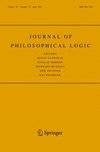赫拉克利特--最大世界
IF 1
1区 哲学
0 PHILOSOPHY
引用次数: 0
摘要
在广义相对论中,赫拉克利特不对称特性要求没有一对不同的时空事件具有相同的局部结构曼查克和巴雷特(2023)。在这里,我们将探讨赫拉克利特最大世界--那些与赫拉克利特特性相关的 "尽可能大 "的世界。利用佐恩(Zorn)定理,我们证明了这种世界的存在,并强调了它们的一些特性。如果把注意力局限于赫拉克利特-最大世界,我们将展示观察者在哪些意义上拥有认识论资源来知道他们居住在哪个世界。本文章由计算机程序翻译,如有差异,请以英文原文为准。
Heraclitus-Maximal Worlds
Within the context of general relativity, the Heraclitus asymmetry property requires that no distinct pair of spacetime events have the same local structure Manchak and Barrett (2023). Here, we explore Heraclitus-maximal worlds – those which are “as large as they can be” with respect to the Heraclitus property. Using Zorn’s lemma, we prove that such worlds exist and highlight a number of their properties. If attention is restricted to Heraclitus-maximal worlds, we show senses in which observers have the epistemic resources to know which world they inhabit.
求助全文
通过发布文献求助,成功后即可免费获取论文全文。
去求助
来源期刊

JOURNAL OF PHILOSOPHICAL LOGIC
PHILOSOPHY-
CiteScore
2.50
自引率
20.00%
发文量
43
期刊介绍:
The Journal of Philosophical Logic aims to provide a forum for work at the crossroads of philosophy and logic, old and new, with contributions ranging from conceptual to technical. Accordingly, the Journal invites papers in all of the traditional areas of philosophical logic, including but not limited to: various versions of modal, temporal, epistemic, and deontic logic; constructive logics; relevance and other sub-classical logics; many-valued logics; logics of conditionals; quantum logic; decision theory, inductive logic, logics of belief change, and formal epistemology; defeasible and nonmonotonic logics; formal philosophy of language; vagueness; and theories of truth and validity. In addition to publishing papers on philosophical logic in this familiar sense of the term, the Journal also invites papers on extensions of logic to new areas of application, and on the philosophical issues to which these give rise. The Journal places a special emphasis on the applications of philosophical logic in other disciplines, not only in mathematics and the natural sciences but also, for example, in computer science, artificial intelligence, cognitive science, linguistics, jurisprudence, and the social sciences, such as economics, sociology, and political science.
 求助内容:
求助内容: 应助结果提醒方式:
应助结果提醒方式:


